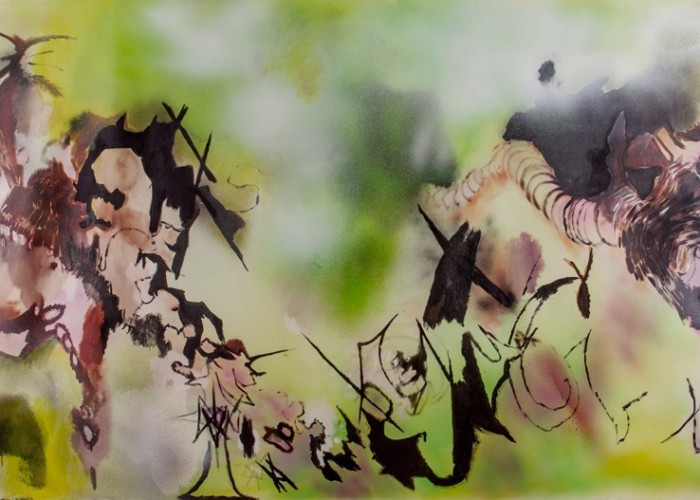Revealing the local
translated by Addie Leak
The vicissitudes of literary endogamy can be highly enigmatic; in some cases, they can be equally wonderful. Javier Calvo, the most prolific and delightfully eccentric of Spain’s contemporary novelists, also happens to be the translator of David Foster Wallace, J. M. Coetzee, Michael Chabon, H.G. Wells, among others. Here he discusses the market for translations in English and in Spanish with fiction-writer and translator Mara Faye Lethem. A native New Yorker now living in Barcelona, Mara is Javier’s wife, the mother of his children, and his translator. She is also the sister of Jonathan Lethem, a writer introduced to Spanish-language readers by his brother-in-law, Javier. Following this conversation, we are pleased to present an excerpt from Javier’s latest novel, The Hanging Garden, awarded the Seix Barral Biblioteca Breve Prize, in Mara’s translation.
* *
Javier Calvo: The other day I saw a book by Alejandro Zambra on a list of the most anticipated books of 2013 in the United States, and I wanted to ask you this: what do you think of this phenomenon, which to me is one of the most important things that have happened in American publishing in a long time? I’m talking about the attention Spanish-language fiction has been getting since Bolaño. How have you experienced this change as a translator, reader, scout, etc?
Mara Faye Lethem: Do you see it as so distinct from the Boom? Because I don’t.
Javier Calvo: I do see significant differences from the Boom. To begin with, I think the boom was much more a strategy, and as such it had a center. And when I say strategy, I say it almost in the sense of the British Invasion: we’re going to take over North America. Here, I don’t see too much strategy, and as a matter of fact I don’t see how an editor could hope to get rich on the books of Aira or Zambra. Secondly, the Boom in America was a much more asymmetrical phenomenon, the rich neighbor’s consumption of a series of consumer elements related to exoticism and magic.
Look, for example, at the resounding failure as strategies of all the “commercial brands” of exportation of Latin American literature: McOndo, the Crack Movement…
In the current case it’s true that Bolaño has been sanctioned by the American world of culture as the “Chosen One” to replace GGM [Gabriel García Márquez] as the Great Novelist in Spanish, but I also see differences: it seems to me that the acceptance of the new literature in Spanish already lacks that aspect of consumption of the poor, the exotic, and the distinct. I believe that now, strangely, it already has a certain aspect of normalcy, acceptance of the two-directional cultural tides that exist between Spanish and English. Although this may perhaps be overly optimistic.
Mara Faye Lethem: Well, when they talk about Aira as the new Bolaño, yes, that implies a certain strategy of marketing. I think that the case of Bolaño has been an astounding example of the unpredictability of the editorial world, and the strategy of buying books in other people’s styles is ridiculous, but shows no signs of waning. I suppose people’s lack of vision, as well as their fear, just get bigger and bigger than their risk-taking….
I suppose I see the Boom in another way, as the time when people that thought of themselves as educated had to have read certain authors in translation. Maybe I’m naïve, but I didn’t see it as cultural colonialism, just as an opportunity to open up the conversation.
In the United States, there has always been a very limited interest for literature in translation, but it has existed: Smilla’s Sense of Snow, Banana Yoshimoto, etc. And I think that Latin American literature, based on proximity and on actual interest, has always occupied an important place. Always taking into account that it is translated very, very little. I see that editors are still relying a lot on things like the Granta list to make their selections. But yes, I perceive a major recognition of the poverty of a reading culture that places more weight on exportation than importation—yes. Also, I’m seeing more literary agents from the Anglo-Saxon world represent foreign authors.
I also see a different atmosphere around literature in translation, but this has been gradually on the rise with more small publishing houses, some dedicated exclusively to translation and others that are extensions of “globalization” and the fact that the world needs fewer intermediaries. Look, for example, at what New Directions has been managing to do for decades, without much reliance on the bestseller lists.
Javier Calvo: In any case, this phenomenon affects you directly, since your line of work means you get caught in the middle. There’s a lot of talk about the role of the cultural mediator as relates to translation. Much more, I think, in the case of translators from Spanish to English, who have a lot more power than translators from English into Spanish, but tell me: what practical problems do you see in the exercise of that mediation? What misunderstandings, errors, and prejudices are you obliged to rectify when you work with US editors or journalists?
Mara Faye Lethem: More power in what sense? The difference that I see is that here (Spain) translation is considered more of a profession, and there it’s an “art.” Both things have their good sides and their bad sides. I see that the translator has more power only in the sense that Anglo-Saxon editors will publish a translation as though it were a new book, which is something I don’t see happening in the other direction.
One practical problem that I am noticing lately is that many interesting novels stay outside the “prestigious international literature” framework because they are a specific genre. I think that these borders between genres are more of an obstacle than they should be, while no one bats an eye when American literary authors incorporate elements of the thriller or fantasy.
Javier Calvo: You’ve talked indirectly about globalization and the lack of a need for intermediaries. In this sense, I see two opposing phenomena. On the one hand, a tendency to eliminate borders and intermediaries. This phenomenon is helped along by the Internet, by transnational cultural projects, and by the fact that people are moving with more and more liberty in the world. On the other hand, when one attempts to overstep cultural boundaries, he or she finishes by coming up against a series of invisible but very solid walls.
Mara Faye Lethem: The classic: “This book is too local.”
Javier Calvo: For example: you live in Spain, you write and publish fiction in Spain. I’ve published a story here and there in American magazines, but essentially I am a Spanish writer. This means that there’s a resistance to cultural exchange, that maybe it’s natural and something we all have to overcome. (If we’re interested, obviously.) How do you experience this from the paradox of being American, publishing translations in America, and yet still having a parallel identity in Spain?
Mara Faye Lethem: Well, it seems as though you’re mixing things up a little here. I think that actually, in the US, a country of immigrants, there is and always has been a big margin of acceptance of artists coming from elsewhere— Nabokov, to pick an easy example. This is not your case. You’ve never really lived in the United States. But if you wanted to do, for example, what Lila Azam Zanganeh has done, you could. Both authors using English as their language of writing, of course. Which isn’t your case, either. I’ve also noticed that here I continue being American.
As a matter of fact, globalization generally seems to be changing the economic world more than the cultural. In the end, how many Chinese authors have you read? I suppose it’s easier to import capital than ideas. But this is exactly the interesting and essential thing about translation, revealing the local. Lately I’ve been especially interested in a little publishing house called Europa Editions, precisely because they exist between various worlds… coming from Italy but established in New York and made up of people from all over. To the point that they’re actually publishing in Arabic.
As far as the personal goes, it’s a very schizophrenic life. I’ve had to people my little world with trilingual beings holding multiple passports.
* *
from The Hanging Garden by Javier Calvo, translated by Mara Faye Lethem
Further north, the landscape deteriorates shockingly quickly. Visibility diminishes and the air is weighted down with a strange sensation that’s not just the storm’s electricity. Muria’s rain slicker crackles and gives off static electric sparks. The forest path he pedals along is filled with the remains of dead animals, probably poisoned by the meteorite cloud in the first few hours after it hit. The only way he can continue is by pedaling with one hand on the handlebars and the other holding up the flashlight to illuminate the path. Flashes of lightning tint the atmosphere a purplish color unlike anything Muria’s ever seen before. There where the canopy of tree branches don’t allow the rain through, the flashlight shows millions of ash particles suspended in the air. Finally, after an hour of pedaling, Muria reaches the top of a hill and the Sallent Valley appears before his eyes.
The impact left a hole in the valley like a rock dropped into a cake. The crater is two kilometers long and five hundred meters wide at its deepest point. It’s hard for Muria to imagine that its steep slopes didn’t exist just three months ago. Beyond it lies the deserted town. Muria remembers having read that the earth tremor knocked down entire houses in Sallent and opened up a rift in the center of the town that swallowed several cars. Seen with his own eyes, the column of smoke that emerges from the crater doesn’t look like the column of smoke they’ve been showing on television. It looks nothing like it. Its dimensions are ancient. The darkness of the valley is the darkness of a stormy night. But it is one in the afternoon.
“Son of a bitch,” murmurs Muria.
He rolls down the hill at top speed and is about to run into a group of individuals in protective suits who walk among the tree skeletons. At the last minute he manages to throw himself and the bicycle to the ground to avoid being seen. The individuals advance in procession through the scorched landscape, in their full-body hermetic Teflon suits, with boots and rubber gloves and gas masks soldered to protective hoods. The single file accentuates the comic aspect of their duck-like gaits. The one leading the procession is carrying some sort of measuring device that looks like a microphone connected to a briefcase by a spiral cable. Muria waits for them to disappear beneath the rain and then peels himself off the ground’s black mud.
On the hot slopes of the crater, the feeling of desolation is almost unbearable. As he ascends, Muria thinks about bodies blown up by bombs. About disembodied voices. About lies. To his right, a chimney some ten meters high in the middle of the slope vomits black smoke. His rain slicker is already completely smeared in black mud. His flashlight barely manages to illuminate a few meters. On a couple of occasions Muria thinks he sees more people with Teflon suits walking beneath him, and at one point he is almost sure they’re gesturing to him. The beam from his flashlight must be visible for a radius of several kilometers. Muria continues climbing through the mud and rocks. He has no idea how long he’s been there when he makes out the second light. It is still above him but not far off. He quickens his step.
When he finally finds him, at the very edge of the crater, Daniel M. Dorcas is on his knees on the ground. His flashlight tossed a few feet away. He is wearing the same coat as always, covered in mud. His hair matted and his face completely black. Surprised, Muria realizes that his face must be black, too. He illuminates him with his flashlight beam and walks toward him. Dorcas doesn’t do anything. He doesn’t move. Muria puts a hand on his shoulder. Dorcas looks at him without surprise.
“It’s dead,” says Dorcas. And he points.
Muria dares to look inside the crater for the first time. There in the depths, after three months, the heart of the impact is still glowing. A pulsing, ashen red gleam, the gleam of geological magma.
“It didn’t come to bring us any message,” says Dorcas. “It fell because it was dead.”
Muria thinks about messages in code crossing the ether. Nothing is what it seems anymore.
“We’re alone,” says Dorcas. “It died and left us alone. Alone in the universe. What will become of us?”
Muria thinks about New Spain. He thinks about things that have died but which no one will admit have died. About things that stopped existing thousands of years ago but which continue occupying the same void, because everyone acts as if they’re still alive. Rotted things laying in wait in dark offices.
And pulling out a pack of cigarettes with muddied hands, he lights one and sits down beside Dorcas to smoke it.
* *
Image: Carmen Burguess
[ + bar ]
Alfredito
Liliana Colanzi translated by Chris Meade
Once, when I was a little girl, I saw a pig being killed. It was summer. Flies were launching themselves against the windows.... Read More »
Smoke
Giovanna Rivero translated by Rachael Small
The pointless memories are the most beautiful ones. I must have been, what, eight years old when this guy with a... Read More »
An American Poet’s Dream: an interview with David Shook
Interview and introduction by Pola Oloixarac translated by Heather Cleary
A young professor of literature in Los Angeles collects funding and poems online in order to make... Read More »
The Turtle & the Fox
Debora Kuan
Take him for all in all, I shall not look upon his like again. -Shakespeare, Hamlet
My first encounter with my colleague Ivan Fox’s... Read More »








 sending...
sending...